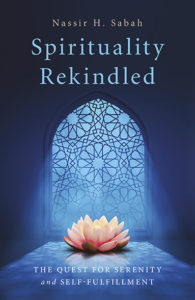Nassir H. Sabah
“Repudiating the supernatural in the name of science is like a blind man denying the existence of what he cannot see.” Nassir Sabah
Most scientists cling to a religious-like belief in science despite the severe limitations of present-day science. Although scientific thought and progress are assuredly one of the greatest achievements of humanity, if not the greatest, a growing number of thoughtful scientists acknowledge that present-day science cannot adequately serve as the beacon to guide one’s life, shape one’s philosophy of life, one’s worldview, and answer the most important existential question: what is the meaning and purpose of life? It becomes natural, therefore, to look beyond science with an open mind. This is not depreciating science but more like using it as a springboard to what is beyond the scope and reach of present-day science.
To many scientists, organized religion does not provide a satisfactory answer to the aforementioned existential question, as it embodies tenets and practices that are seemingly irreconcilable with scientific thinking. Hence, most scientists are atheists or agnostics at best. A rational spirituality, defined as a quality of being predicated on a sense of connection to The Almighty, provides a convincing and satisfying answer to the seemingly inscrutable existential question. Evidently, however, this spirituality hinges on an affirmative answer to the cardinal question: Does The Almighty exist in the first place?
The book, Spirituality Rekindled: The Quest for Serenity and Self-Fulfillment⁕, presents incontrovertible, science-based, and objective evidence for the existence of The Almighty, the creator of the universe and the sustainer and guide of everything in it. This evidence is derived from the irrefutable assertion that the Quran cannot possibly be of human origin, based principally on: (i) numerous, unmistakable references to physical phenomena that were well beyond observation or explanation in the 7th century CE when the Quran was revealed and which have since been confirmed by science; and (ii) an intricate web of numerical relations involving letters, verses, and chapters of the Quran, and which could not possibly be all coincidental or of human origin. Skeptics are challenged to explain away the myriad miraculous features of the Quran. In this context, the Quran is to be regarded by non-Muslims as a stand-alone text that should be judged on its own merits, with an open mind and without prejudice or bias.
The advocated spirituality provides the foundation for a continual, immensely beneficial, and comprehensive self-development – spiritually, psychologically, morally, and intellectually – driving toward a target state of supreme serenity and self-fulfillment. It is this self-development that gives meaning to life and is a prerequisite for attaining eternal bliss in heaven, which is the supreme purpose of life and the ultimate reward, unsurpassed by any worldly gains or successes.
It behooves scientists to heed the message of Spirituality Rekindled and not haughtily dismiss it under the guise of false sophistication and high-minded intellectualism. In the words of Shakespeare’s Hamlet: “There are more things in heaven and earth than are dreamt of in your philosophy, Horatio.”
